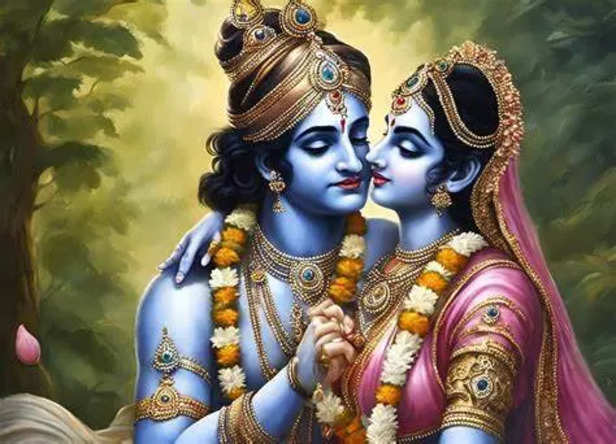If Krishna Himself Was Betrayed, Why Do We Expect Loyalty?
Nidhi | Mar 26, 2025, 23:31 IST
( Image credit : Times Life Bureau )
Even Lord Krishna, the divine guide of the Bhagavad Gita, faced betrayal—by his own kin, allies, and those he trusted most. If he, with all his wisdom, couldn’t escape disloyalty, why do we expect unwavering loyalty from others? This article explores Krishna’s experiences, the nature of trust, and how his teachings help us navigate betrayal, relationships, and self-worth in a world where change is the only constant.
असत्यं प्रत्यक्षं लोके, सत्यं तु गुह्यवर्तते।
(What is seen may not be true, and what is true often remains hidden.)
Loyalty. We crave it in relationships, friendships, and even in workplaces. We want people to stand by us, to be unwavering in their faithfulness. But let’s take a step back—if Krishna, the very embodiment of wisdom and divine love, faced betrayal, why do we assume we’ll be spared?
Krishna’s life was filled with devotion, but it was also riddled with deception. His own Yadava clan, the people he nurtured and protected, fought amongst themselves until they perished. His childhood friend Sudama, out of hesitation and ego, refrained from asking for help when he needed it the most. And Karna, bound by his duty to Duryodhana, stood against Krishna’s guidance, ultimately meeting his tragic fate.
If even the divine was not exempt from betrayal, perhaps loyalty is not a constant but a fleeting choice. Instead of asking, “Why do people betray?” maybe the real question is, “Why do we expect anything else?”
"सुखदुःखे समे कृत्वा लाभालाभौ जयाजयौ।"
(Treat joy and sorrow, gain and loss, victory and defeat as equal – Bhagavad Gita 2.38)

We often see loyalty as something that should be absolute. We believe that if we have been good to someone, they should stand by us no matter what. But Krishna’s life tells a different story.
Krishna never demanded loyalty, nor was he shaken when it was broken. He understood that devotion and betrayal are simply two sides of the same human experience. People change, circumstances shift, and even the deepest bonds can break. Instead of expecting eternal faithfulness, what if we accepted that people will come and go?
Perhaps, the only loyalty we can truly count on is the one we give to ourselves.
 Betrayal stings, but it is never as painful when it comes from strangers. The deepest wounds are inflicted by those we love the most. Krishna experienced this firsthand with the Yadavas—the very people he led, guided, and protected. In the end, their own internal conflicts led to their downfall.
Betrayal stings, but it is never as painful when it comes from strangers. The deepest wounds are inflicted by those we love the most. Krishna experienced this firsthand with the Yadavas—the very people he led, guided, and protected. In the end, their own internal conflicts led to their downfall.
Think about it—have you ever felt more betrayed by a friend than by a stranger? More hurt by a close family member’s actions than an outsider’s? It’s because we invest in those relationships. We build expectations, we trust, and we believe that our bond is different. But if Krishna, despite his wisdom and divine love, was betrayed by those closest to him, doesn’t that tell us something about human nature?
Maybe loyalty is not about who betrays us, but how we deal with it when it happens.
"योगस्थः कुरु कर्माणि संगं त्यक्त्वा धनंजय।"
(Perform your duty without attachment, O Arjuna – Bhagavad Gita 2.47)

Krishna was deeply connected to people, yet he was never attached. He loved freely, helped unconditionally, and yet, he never held on too tightly.
Most of our pain comes from attachment. We expect relationships to last forever. We expect people to remain the same. But Krishna teaches us that nothing is permanent—love, friendships, even kingdoms rise and fall. Instead of clinging to promises and expecting lifelong loyalty, what if we embraced impermanence?
When we love without attachment, we are free from the pain of betrayal. Krishna showed us this—not by being indifferent, but by accepting change with grace.
 We often take betrayal personally. “How could they do this to me?” we ask. But what if the betrayal wasn’t about us at all?
We often take betrayal personally. “How could they do this to me?” we ask. But what if the betrayal wasn’t about us at all?
Take Karna, for instance. He fought against Krishna, against his own brothers, against dharma itself. Was it because he hated Krishna? No. He was bound by loyalty to Duryodhana. He had made a choice—a choice he felt was his duty.
Sometimes, people leave, deceive, or turn against us not because they wish us harm, but because their own journey demands it. What if instead of seeing every betrayal as a personal attack, we looked at it the way Krishna did? He did not hold resentment toward Karna—he understood his conflict.
If we started seeing betrayal as a reflection of someone else’s path, rather than our own failures, wouldn’t we suffer less?
 Even Krishna, despite all his wisdom and divine power, was doubted, questioned, and even cursed. There were those who saw him as a god, and those who saw him as a manipulator. He performed miracles, yet many remained blind to his greatness.
Even Krishna, despite all his wisdom and divine power, was doubted, questioned, and even cursed. There were those who saw him as a god, and those who saw him as a manipulator. He performed miracles, yet many remained blind to his greatness.
If Krishna, the very source of truth, was misunderstood, can we really expect everyone in our lives to appreciate our loyalty?
Maybe the real lesson is that seeking validation is futile. The only thing that truly matters is doing what is right, regardless of whether people recognize it or not.
"नात्मनः प्रतिकूलानि परेषां न समाचरेत्।"
(Do not do unto others what is harmful to yourself – Mahabharata, Shanti Parva)

At the end of the day, Krishna’s greatest lesson is this: be loyal to yourself first.
We spend so much energy expecting others to be faithful to us, but how often do we stay true to our own values? How often do we betray ourselves—by compromising our beliefs, tolerating disrespect, or holding onto people who have already let go?
Krishna teaches us that the greatest loyalty is to our own soul. When we stand by our values, when we remain true to our dharma, we become unshakable.
We live in a world where change is the only constant. People evolve, loyalties shift, and promises are broken. If Krishna—the one who moved mountains and guided generations—was not spared from betrayal, why do we expect to be?
Instead of lamenting over broken bonds, maybe it’s time we embraced Krishna’s wisdom:
After all, if Krishna could move forward with grace, so can we.
(What is seen may not be true, and what is true often remains hidden.)
Loyalty. We crave it in relationships, friendships, and even in workplaces. We want people to stand by us, to be unwavering in their faithfulness. But let’s take a step back—if Krishna, the very embodiment of wisdom and divine love, faced betrayal, why do we assume we’ll be spared?
Krishna’s life was filled with devotion, but it was also riddled with deception. His own Yadava clan, the people he nurtured and protected, fought amongst themselves until they perished. His childhood friend Sudama, out of hesitation and ego, refrained from asking for help when he needed it the most. And Karna, bound by his duty to Duryodhana, stood against Krishna’s guidance, ultimately meeting his tragic fate.
If even the divine was not exempt from betrayal, perhaps loyalty is not a constant but a fleeting choice. Instead of asking, “Why do people betray?” maybe the real question is, “Why do we expect anything else?”
1. Loyalty Is a Choice, Not a Guarantee
(Treat joy and sorrow, gain and loss, victory and defeat as equal – Bhagavad Gita 2.38)

Loyalty
( Image credit : Freepik )
We often see loyalty as something that should be absolute. We believe that if we have been good to someone, they should stand by us no matter what. But Krishna’s life tells a different story.
Krishna never demanded loyalty, nor was he shaken when it was broken. He understood that devotion and betrayal are simply two sides of the same human experience. People change, circumstances shift, and even the deepest bonds can break. Instead of expecting eternal faithfulness, what if we accepted that people will come and go?
Perhaps, the only loyalty we can truly count on is the one we give to ourselves.
2. Betrayal Hurts the Most When It Comes from Those We Love

Betrayal
( Image credit : Pexels )
Think about it—have you ever felt more betrayed by a friend than by a stranger? More hurt by a close family member’s actions than an outsider’s? It’s because we invest in those relationships. We build expectations, we trust, and we believe that our bond is different. But if Krishna, despite his wisdom and divine love, was betrayed by those closest to him, doesn’t that tell us something about human nature?
Maybe loyalty is not about who betrays us, but how we deal with it when it happens.
3. Attachment Leads to Pain—Detach Like Krishna
(Perform your duty without attachment, O Arjuna – Bhagavad Gita 2.47)

Radha-Krishna
( Image credit : Times Life Bureau )
Krishna was deeply connected to people, yet he was never attached. He loved freely, helped unconditionally, and yet, he never held on too tightly.
Most of our pain comes from attachment. We expect relationships to last forever. We expect people to remain the same. But Krishna teaches us that nothing is permanent—love, friendships, even kingdoms rise and fall. Instead of clinging to promises and expecting lifelong loyalty, what if we embraced impermanence?
When we love without attachment, we are free from the pain of betrayal. Krishna showed us this—not by being indifferent, but by accepting change with grace.
4. Betrayal Is Not Always Personal—Sometimes, It’s About Dharma

Mahabharata
( Image credit : Times Life Bureau )
Take Karna, for instance. He fought against Krishna, against his own brothers, against dharma itself. Was it because he hated Krishna? No. He was bound by loyalty to Duryodhana. He had made a choice—a choice he felt was his duty.
Sometimes, people leave, deceive, or turn against us not because they wish us harm, but because their own journey demands it. What if instead of seeing every betrayal as a personal attack, we looked at it the way Krishna did? He did not hold resentment toward Karna—he understood his conflict.
If we started seeing betrayal as a reflection of someone else’s path, rather than our own failures, wouldn’t we suffer less?
5. Not Everyone Will See Your Worth—And That’s Okay

Ego
( Image credit : Pexels )
If Krishna, the very source of truth, was misunderstood, can we really expect everyone in our lives to appreciate our loyalty?
Maybe the real lesson is that seeking validation is futile. The only thing that truly matters is doing what is right, regardless of whether people recognize it or not.
6. Be Loyal to Yourself First—The Rest Will Follow
(Do not do unto others what is harmful to yourself – Mahabharata, Shanti Parva)

Love Yourself
( Image credit : Pexels )
At the end of the day, Krishna’s greatest lesson is this: be loyal to yourself first.
We spend so much energy expecting others to be faithful to us, but how often do we stay true to our own values? How often do we betray ourselves—by compromising our beliefs, tolerating disrespect, or holding onto people who have already let go?
Krishna teaches us that the greatest loyalty is to our own soul. When we stand by our values, when we remain true to our dharma, we become unshakable.
If Krishna Was Betrayed, Why Do We Expect Anything Else?
Instead of lamenting over broken bonds, maybe it’s time we embraced Krishna’s wisdom:
- Expect nothing, appreciate everything.
- Love without attachment.
- Understand that betrayal is not always about us.
- Be loyal to our own path, above all else.
After all, if Krishna could move forward with grace, so can we.
